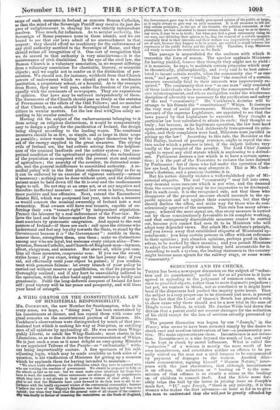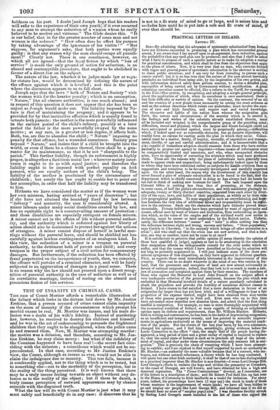SEDUCTION AND ITS CHECKS.
THERE has been a newspaper discussion on the subject of "seduc- tion and its punishnient," useful so far as all parties to it have agreed in appealing to the judgment of common sense, with a view to practical objects, rather than to mere dogmatic prejudices ;. but yet, we venture to think, not so conclusive as it might have been if the disputants had pushed the inquiry quite home. That the subject is a very proper one to be discussed just now, is proved by the fact that the Court of Queen's Bench has granted a rule to show cause why there should not be a new trial in the case of Dingle versus Baker, in which Mr. Justice Wilde laid down the dictum that a parent could not recover damages for the seduction of his child except for the loss of 'services actually prevented by illness.
The present discussion was begun by one "Joseph," in the Times ; who seems to have been actuated simply by the desire to olieck cant and needless intervention of law—va.praisewortby ina. tive.• His main arguments are these. Incontinence is not seduc.- tion. Incontinence is a vice beyond the reach of law, and only to be kept in check by moral influence. What is called the- "seduction " of a woman is mostly the mere result of her. own incontinence, and constitutes neither an offence to be pe- nally visited on the man nor a civil trespass to be compensated by payment of damages . to the woman. Another dilet-. tante commentator, signing himself "Human Nature," inter... poses with the just observation, that although incontinencet is an offence, the seduction or " leading on " to the coin- mission of that offence is as clearly a- crime as the leading on • of children to commit theft. And the Globe more for- cibly takes the bull by the horns in joining issue on Joseph* main fact. ." If," says Joseph, ." there is any priority,. it is the. woman•who thakes the first advances—at least so far as to give. the Ulan -to understand -thot she willpot be greatly offended*
boldness on his part. I doubt [and Joseph begs that his readers will refer to the experience of their own youth] if it ever occurred to any man to attempt the seduction of a woman whom he really believed to be modest and virtuous." The Globe denies this. "It is our belief, that in far the greater number of cases man and not woman is the seducer." " How often does he effect his purpose by taking advantage of the ignorance of his victim !" "But suppose, for argument's sake, that both parties were equally guilty: is that any reason why the man should escape all punish- ment!" Clearly not. There is one conclusion, however, on which all are agreed—that the legal fiction by which "loss of service" is made the only ground of action for seduction, is an absurd and contemptible procedure, that ought to be abolished in favour of a direct law on the subject. The nature of the law, whether it be judge-made law or regu- lar statute law, would be determined by defining the nature of the offence against which it is levelled ; and this is the point where the discussion appears to us to fall short. Joseph says that the laws "both of Nature and Society" visit the woman with far the heavier penalty ; which is an assumption. "Nature," like all obscure authorities, is one much abused ; and in respect of this question it does not appear that she has been so unjust.as Joseph would make out. The liability imposed by Na- ture is that of maintaining the progeny; and it appears to be provided for by that instinctive affection which is usually found to actuate both parents : the mother is the more powerfully influenced in the earliest period of the child's infancy, possibly at a later period the father is the more powerfully swayed by the same motive; at any rate, in a greater or less degree, it affects both. Both, too, are free to abandon the child ; " Nature" imposing no penalty for that offence, but a wounded conscience. Society goes .beyond " Nature," and insists that if a child be brought into the world, or even if there be a chance thereof, there shall be a gua- rantee for its maintenance so that it be not "chargeable to the parish." This further liability, though its enforcement is highly proper, is altogether a factitious social law : wherever society inter- venes it ought to do so with equal justice; and therefore the liability. ought to be imposed with perfect equality on both parents, who are equally authors of the child's being. The liability of the mother is proclaimed by the circumstance of childbirth; but surely the law ought to enable her to point out her accomplice, in order that half the liability may be transferred to him. ■ • Hitherto we have considered the matter as if the woman were her own mistress, having arrived at "years of discretion"; but if she have not attained the boundary fixed by law between "infancy" and maturity, the case Is considerably altered. A minor labours under many social disabilities created by law, and has an equitable right to a countervailing amount of protection : and these disabilities are especially stringent on female minors. A minor cannot act in the affairs of life without parental author- ,ity, and the authority which is enforced against her liberty of action should also be maintained to protect her against the actions of strangers. A minor cannot dispose of herself in lawful mar- riage without the parental leave, and should be shielded not less carefully against lawless contingencies of an analogous kind. In this view, the seduction of a minor is a trespass on parental authority, to the detriment both of parent and child ; and every trespass is the proper subject of a civil action for compensatory damages. But furthermore, if the seduction has been effected by fraud perpetrated on the inexperience of youth, then, we conceive, the offence will partake of a criminal character, and will be fairly subjected to an aggravation of damages in a penal sense. There is no reason why the law should not proceed upon a direct recog- nition of parental authority in the case of seduction as well as of its correlative marriage, instead of resting on the absurd and precarious fiction of lost services.



























 Previous page
Previous page